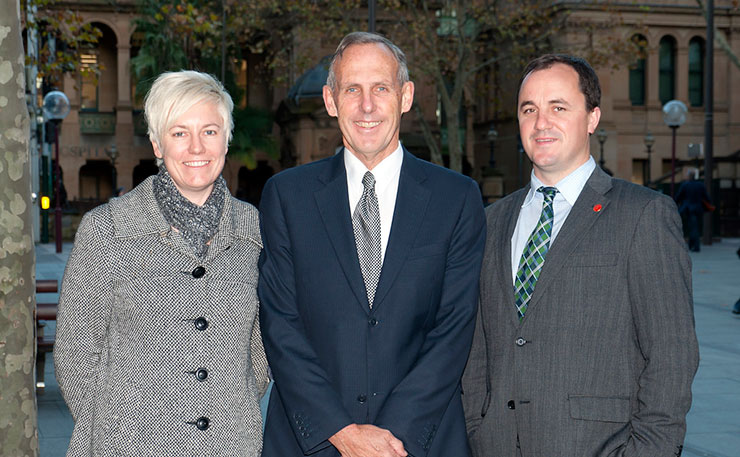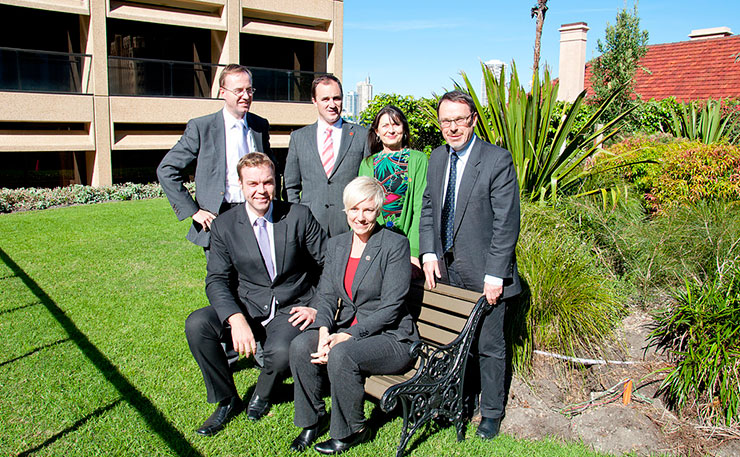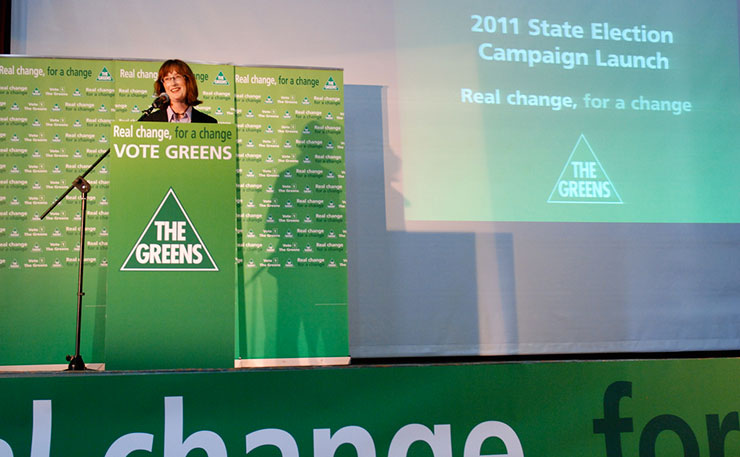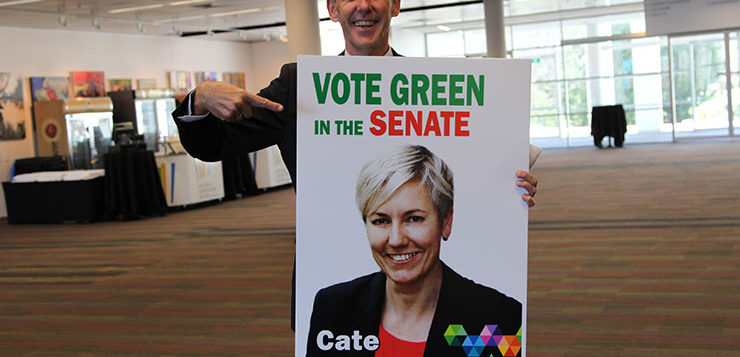In the second of a special three part series, Michael Brull reviews an internal Greens NSW battle that spilled into the public, and ultimately into a court room.
In the first of this three part series, I explored the procedural matters that led to Greens NSW fighting member Cate Faehrmann in the Supreme Court of NSW over the provisional nature of her membership, which blocked her urgent run for pre-selection for a recently vacated seat in NSW Parliament.
Faehrmann ultimately won her battle in court, but it in my view, this was grossly and unfairly distorted by NSW Greens MLC Justin Field. When Faehrmann won, Field discussed the matter with the Guardian. He accused the party bureaucracy of running “internal political agendas” in blocking Faehrmann’s candidacy. He reportedly claimed that democratic reforms were “now becoming more urgent”.
He was “concerned at what appears to be the party bureaucracy running internal political agendas rather than acting in the overall interest of the Greens and grassroots democracy… This approach is deeply divisive, distresses members and costs the party financially.”
Faehrmann framed the issue similarly. In responding to the judgment she wrote “I felt I had to stand up and defend our grassroots democracy.”
As should be clear, this entirely reverses the actual record. The decision made at the SDC wasn’t due to a bureaucracy pursuing “internal political agendas”. The SDC followed their traditional processes requiring a huge majority to change things. None was reached.

The bureaucracy would have defied the actual democratic decisions under the Greens constitution if they had acted differently and sought legal advice or let Faehrmann bypass her provisional status.
Faehrmann, as per above, complained that the party did not seek legal advice, though they had no mandate to do so. She concluded that due to their failure to act – contrary to the lack of mandate established at SDC – she was “distressed to be left with no other alternative” than to seek urgent relief at court.
Faehrmann similarly hailed the decision in her favour as reinforcing the “primacy of grassroots democracy”. It is hard to square this with how she responded to the only relevant democratic process that was involved in relation to this issue.
Once Faehrmann’s lawyers issued a summons, there was little choice but to seek legal representation. Faehrmann named the membership officer, and the Greens NSW as the defendants of the action, seeking relief and costs. As the ruling of the court would affect the constitution of the party, and also determine whether it would have to pay a large legal bill, I think there was little option at that point but to hire lawyers to defend their party and their interpretation of the constitution.
No other alternative?
Faehrmann said that she had “no other alternative” than to seek an urgent ruling on her membership status. Here, an analogy may be useful.
In many sports, from rugby league to karate, referees will sometimes issue controversial rulings. Sometimes, players will be penalised unfairly. Sometimes the ruling will cause a tremendous disadvantage. It is impossible to avoid referees getting things wrong sometimes.
At a professional level, these rulings can have an enormous impact on careers and lives. Ultimately, players have to accept bad calls sometimes, despite how awful those calls can get.
There are occasions where a ruling could be so outrageous, that it simply couldn’t be allowed to stand. For the matter of Faehrmann’s membership, how one feels about her decision to go to court depends at least partially on how serious one regards the infringement on her rights, as compared to the importance of being bound by internal party processes. There is also a need to compare the seriousness of the infringement of her rights by the misinterpretation of the constitution, versus the cost to the party, including the financial cost.
In February, the Guardian produced a useful graphic on Greens NSW income. It showed they received some $4.4 million from 2016-17. About $4 million came from the Australian Electoral Commission, which gives parties money in exchange for votes. Most of the significant donations came in the form of tithes, paid by elected political representatives to the party (e.g., $19 752 from David Shoebridge). $52 000 came from the estate of Cecily Dignan, and $89 000 came from members.
Total costs may take some time to calculate, but it is fair to say that solicitors and barristers are very expensive. Faehrmann sought costs in her summons, which the judge awarded her. The Greens NSW will thus have to pay for their legal bill, and hers too. Though Faehrmann has said the case was about office bearers, not the membership, she named the Greens NSW as a defendant. She has not explained how this bill should be covered.
Ultimately, the party will have to bear the cost somehow, or the members will have to raise money to cover the cost of her legal action.
Let it be granted that the constitution was adversely interpreted against her rights. Whether or not someone can stand for pre-selection, to me, seems like a relatively minor infringement. If the issue was accusations of sexual assault being covered up, I would regard that as a much more significant matter. In that instance, legal action could conceivably be effective in protecting someone’s rights, or otherwise redressing a serious issue.
In my personal judgment, I think the only thing at issue in whether a provisional member can stand for pre-selection is that person’s career. If a person within a particular political grouping cannot nominate themselves for a few months, they can support the nomination of someone else with similar values and ideology.

To me, that is not a significant sacrifice. Furthermore, if the issue was resolving the rights of members generally, it could have been resolved by campaigning internally in the Greens for change. This would have been more gradual, and would have precluded Faehrmann’s pre-selection. This seems to have been the crux of why it went to court.
If one has to weigh up the right to nominate for pre-selection, versus the value of being bound by the rules and processes of the party – rules and processes that require strong support not from the leadership, but from delegates across the state – I favour the latter.
If one cares about grassroots democracy – as Faehrmann and her ally, the MP Justin Field say they do – then it seems clear that they opposed it in this instance. They could argue that the nomination of Faehrmann outweighed the value of being bound by SDC decisions, and by the rule obliging her to seek mediation. There is nothing wrong with them making that kind of argument, but I don’t think it is at all accurate to claim that they are on the side of grassroots democracy in this matter.
Greens NSW consider Faehrmann’s membership: the political divide
Suppose Faehrmann was universally beloved by all in the party. Suppose she was a tremendous success as an elected state representative, and that her unsuccessful run for a Federal Senate spot had endeared her to party activists. One suspects that the State Delegates Council might have then made a personal exception for her, regardless of whether interstate travellers were still regarded as provisional members. That would have avoided the legal expense of the court battle.
So why didn’t this happen? Here, there are two kinds of political considerations that I think arise. One is procedural, the other is substantive.
The political procedural point is why there is a provision that imposes provisional membership for three months on new members to the Greens. As submitted in court, the point is to prevent branch stacking. Theoretically, if someone wants a local group to be dominated by this or that agenda, a person could bring in a bunch of friends, or operatives from the ALP, or whoever, and use them to change things.
If someone didn’t like the Marrickville Greens position on Palestine, 200 people could join, and quickly overwhelm the group, making it the most pro-Israel chapter of the Greens in Australia.
In a sense, this is not what Faehrmann wanted to do. Yet in a sense, it is clear that she rushed back to NSW to stand for pre-selection, to fill a casual vacancy. This would mean that instead of campaigning for Greens support, and then needing to campaign in a general election, she would simply need to convince voters in NSW to back her over a few rivals.

If she won, she would become a Member of the Legislative Council. As a higher profile candidate, with the benefits of former incumbency, Faehrmann will have a significant advantage over most members, many of whom would need to balance party activism with other professional commitments. Thus, one of her rivals has a Facebook following of 38, another has 115 (the latter, Fiona Byrne, formerly had a national profile for her role in Marrickville Council).
People have expressed dismay at various types of usual suspect types being parachuted into electorates by the ALP or the Liberals, and taking up a safe seat that they don’t know and haven’t done much to earn. The provisions that were formerly applied to Faehrmann may have acted to limit that kind of thing. That is, the overturned interpretation of the relevant constitutional provisions wasn’t frivolous or pointless. There is an actual mischief it was supposed to prevent.
Why didn’t people at the State Delegates Council back Faehrmann? Why weren’t they willing to bypass the provisional status, make an exception for her, or fund legal advice that could have let her in? Here, we should consider that a comment reported in the Murdoch press may be right.
For some in the left of the Greens NSW, “Ms Faehrmann was deeply disliked on ideology and for her style of management”. That is, for people on the left of the party, Faehrmann was deeply controversial. She was not the hypothetical universally beloved candidate. This may have complicated her plea to be able to stand for pre-selection, and may have been why she was unable to stand for pre-selection without a ruling from the Court.
Why she is controversial in the party will be explored in the concluding part three of this series, published tomorrow.
* Michael Brull is a member of the NSW Greens, as declared in part 1 of this article.
Donate To New Matilda
New Matilda is a small, independent media outlet. We survive through reader contributions, and never losing a lawsuit. If you got something from this article, giving something back helps us to continue speaking truth to power. Every little bit counts.




